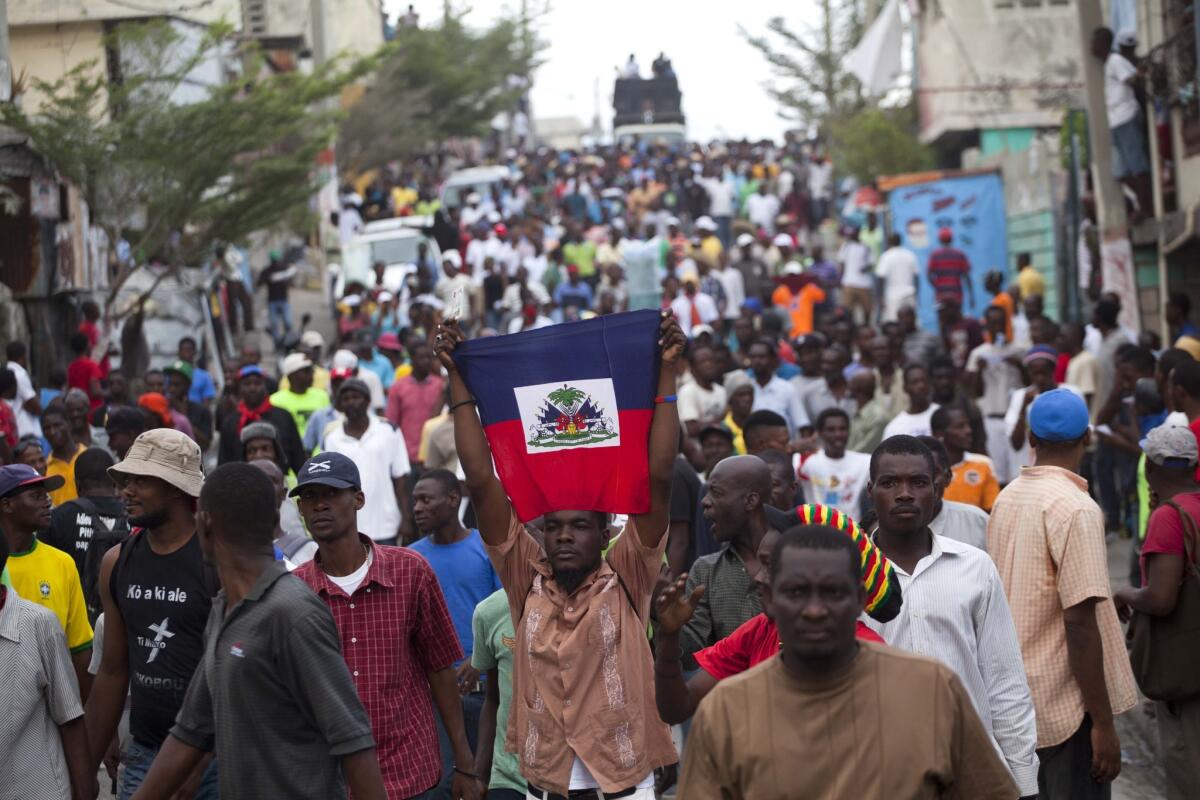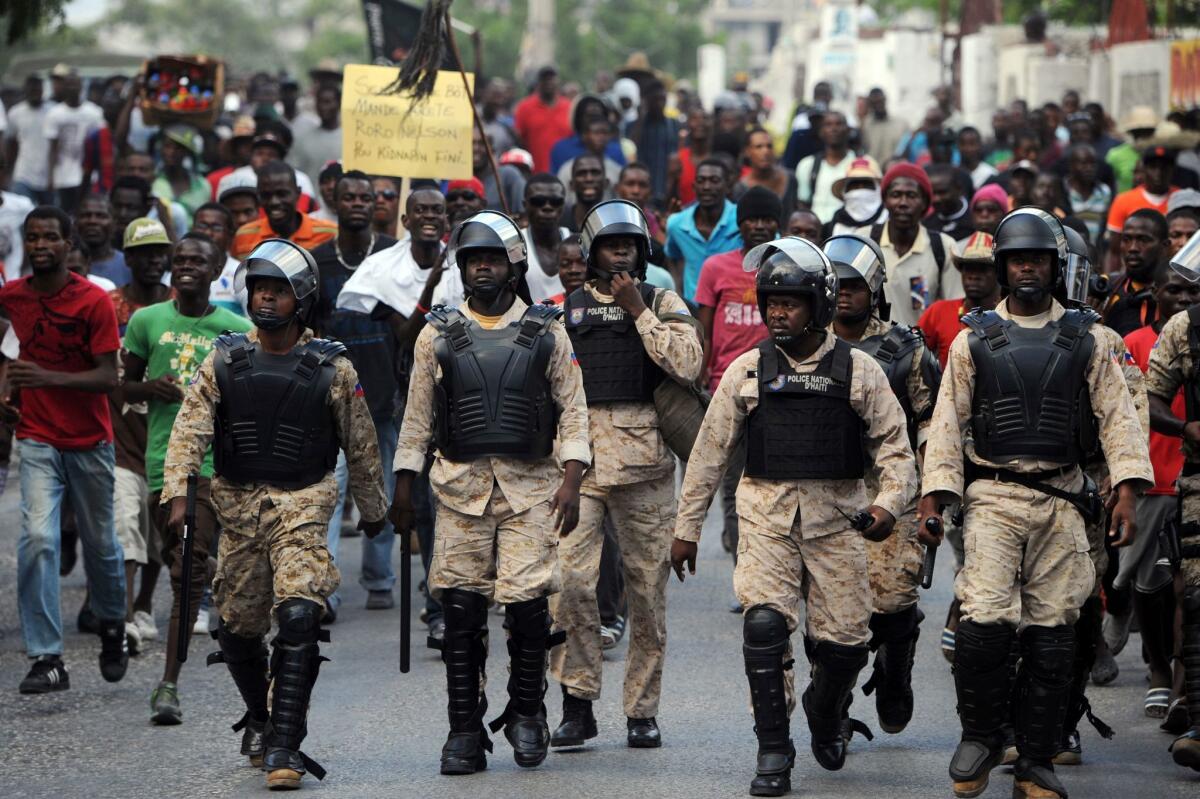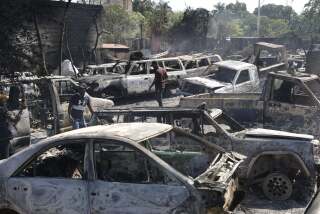Haiti’s leadership is in limbo as political crisis looms

Demonstrators protest the government of President Michel Martelly in Port-au-Prince, Haiti, on Sunday.
With Haiti’s presidential elections postponed again and just over a week left until the current leader’s term expires, various political factions are negotiating to avert a constitutional crisis that could leave the Western hemisphere’s poorest nation with nobody clearly in charge.
The vote was supposed to occur last Sunday, but election authorities last week postponed it indefinitely due to security concerns, including attacks that had occurred on election offices. It was the third time the vote -- a runoff originally scheduled for Dec. 27 -- has been delayed. President Michel Martelly must leave office by Feb. 7.
The crisis threatens to throw the poor and troubled Caribbean country back into the instability and political morass that it has long struggled against.
See more of our top stories on Facebook >>
“You’re looking at a country absolutely mired in institutional chaos,” said Eduardo Gamarra, a professor of political science at Florida International University. “They are teetering on the brink. They are there on the edge of the precipice.”
The elections were already troubled, with opposition candidate Jude Celestin planning to boycott. The former government construction ministry director alleged vote rigging in the first round of elections that took place in October.
The ruling party candidate, Jovenel Moise, a banana exporter and political newcomer, won that round but failed to secure the required majority, thereby necessitating the runoff.
Now the countdown has begun to avert a political catastrophe.

The negotiations include Martelly, parliamentary leaders, opposition groups and members of the private sector.
International observers and academics with knowledge of the proceedings said several scenarios are being weighed. Among them is shelving the current elections, ensuring that Martelly leaves office as scheduled, installing an interim government and holding a completely new vote within weeks or months.
“There has been a deeply fraudulent and violent electoral process up until now,” said Brian Concannon, executive director of the Institute for Justice and Democracy in Haiti, a Boston-based human rights group. “There is an opportunity now to step back and create a much better process. If elections are forced through, it will be setting Haiti up for another very difficult five years.”
Jake Johnston, a research associate at the Center for Economic and Policy Research in Washington, D.C., who observed last October’s elections, said a new government would need to consider deeper restructuring, such as an overhaul of the electoral process.
“You have a lot of systemic problems which require not just cosmetic fixes but serious reforms,” he said.
NEWSLETTER: Get the day’s top headlines from Times Editor Davan Maharaj >>
Martelly, a popular former musician who came to power after winning a presidential runoff in 2011, for years failed to hold local and parliamentary elections and has essentially ruled by decree since January 2015.
The country has struggled to establish a steady democracy since the Haitian Revolution of 1986 that toppled President Jean-Claude Duvalier, whose family had ruled the island with an iron fist since 1957.
Longtime polarization among Haitian politicians and a history of intransigence is going to make it difficult to reach a consensus of any kind, analysts said.
Haiti “has a zero-sum political environment, which means if you don’t win, you lose,” Gamarra said. “In a zero-sum environment, losers are never going to accept the outcome. It’s going to be a long, long negotiation because people are not going to cede.”
Tensions have flared for the last several days as unruly protesters have taken to the streets in Haiti’s capital Port-au-Prince, triggering clashes with security forces.

Haitian police patrol the street during a protest in Port-au-Prince on Monday.
The United States, which considers Haiti a “policy priority” and backed Martelly’s presidency, is calling for calm. Washington, which has pumped $33 million into the elections, had been pushing for the final round to take place before the Feb. 7 deadline. But since the postponement last week, U.S. officials have acknowledged that the chance of new elections happening quickly was unlikely.
“Realistically speaking, we may be looking at some sort of temporary solution until there is a handover to a new elected president,” U.S. Haiti Special Coordinator Kenneth Merten told Reuters. “Our fear is that we go into a situation that is open-ended.”
“In our analysis, that is a dangerous place to go,” Merten said.
Since an earthquake in 2010 devastated Haiti, killing hundreds of thousands and rendering just as many homeless, the U.S. has made available nearly $4 billion to the impoverished nation to help with post-disaster relief as well as reconstruction, development programs and longer-term recovery.
But continued progress in rebuilding the fragile island nation will likely be halted unless Haiti emerges smoothly from its political quagmire, analysts said.
Twitter: @AMSimmons1
ALSO
Can Iran deliver on promises to ramp up oil production?
In Italy, same-sex civil union debate going to lawmakers
World health agency expects Zika virus, linked to birth defects, to reach U.S.
More to Read
Start your day right
Sign up for Essential California for news, features and recommendations from the L.A. Times and beyond in your inbox six days a week.
You may occasionally receive promotional content from the Los Angeles Times.







